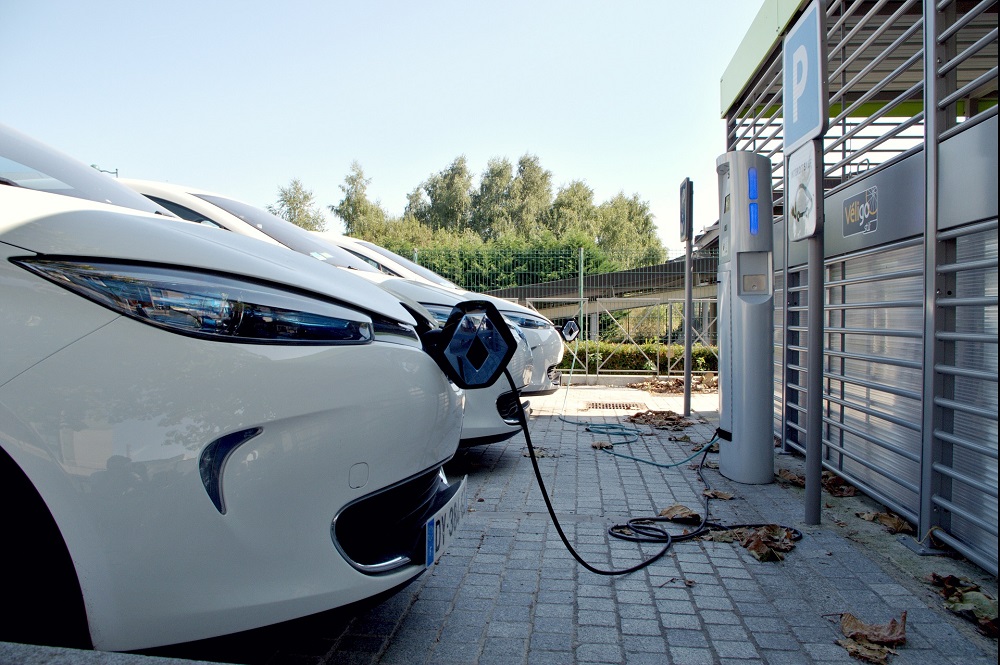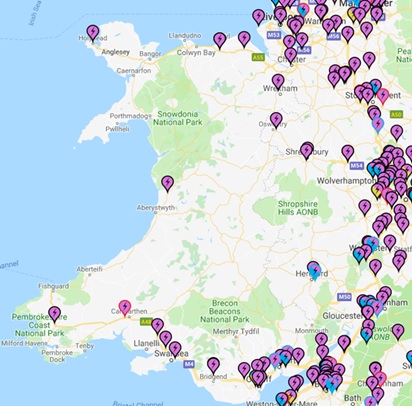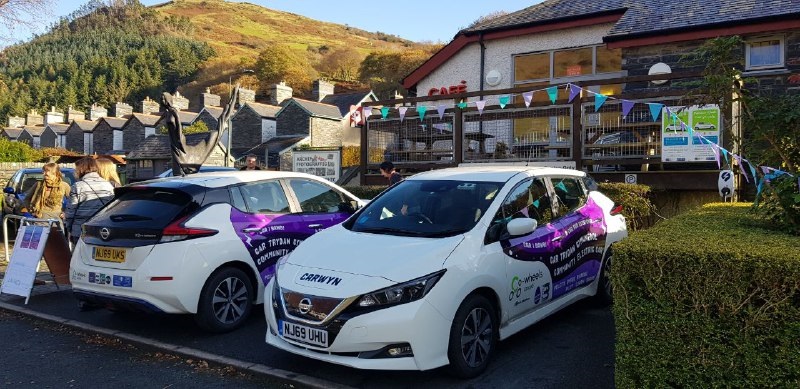Why action on EV charge points is needed to bridge the ‘electric desert’ of Wales

Neil Lewis, TrydaNi
Following the announcement earlier this week of the huge investment by the Westminster Government in building HS2, all eyes have mostly been focused on rail infrastructure and how English, urban centres stand to benefit, while Wales will be negatively impacted.
However, less attention is given to the dire lack of another challenging infrastructural problem facing Wales; one which will aid the decarbonisation of transport – the number of electric vehicle (EV) charge points that we currently have installed.
It seems that England and Scotland will soon have clean air whereas, without an EV charge point infrastructure, all the old diesel cars will see out their time in Wales! We need to develop an EV infrastructure fit for our future, and urgently.

For those of us that have been driving electric vehicles for the past few years, we already know how nerve-wracking it can be to make the journey from north to south or vice-versa in an electric car. We’ve all heard of the ‘desert of Wales’ but mid-Wales is also something of an ‘electric desert’ when it comes to EV charging points.
Knowing that there aren’t any rapid EV charge points on the way, we are left to wing it. Failing that, we have to arrange to wait for a few hours while we charge on a slower charge point.
Because of the paucity of options, it is disastrous to reach an EV charge point to discover that it doesn’t even work. That’s when you realise that the transition to electric vehicles will be unviable unless there is a robust network of chargers installed.
Not everyone can make the switch to electric yet. But the UK government’s decision to bring forward the phase out of petrol and diesel cars to 2035 (and to 2032 in the last few days) means that inevitably, the electric car will become much more common over the coming 10 years.
Community
TrydaNi, a Community Benefit Society, has been established as a means of bringing a community-based solution to this infrastructural problem, help decarbonize Wales, help to develop thriving, sustainable communities and tackle social problems such as transport poverty and social isolation.
Our ambition is to be the “go-to” electric car charging solution for Wales where we can establish a community-owned network servicing all communities in Wales, reinvest any profits in improving the charging network, provide a bi-lingual service, and use locally generated Renewable Energy to power zero carbon miles.
We are also working on the concept of creating community EV car clubs across Wales. This will hopefully bring about a significant change to our psychological attachment to the idea of car ownership, and that we can come to see the car as a community resource to be shared, rather than to be owned. The target here would be two-car households in particular, hoping to dissuade the need for a second car, and encouraging the use of a community car.
This type of community project is already up and running in Gwynedd which has proved to be very successful. Making such projects the norm across Welsh communities is an ideal that a number of community benefit societies in Wales are pursuing.

Support
However, we need an infrastructure of EV charge points that will support such schemes, along with other uses of EV vehicles. This is why community energy projects across Wales have teamed up – to deliver a community-focused solution. We want to see a network of EV charge points across Wales, particularly in rural areas of mid-Wales, and in communities without off-road parking, such as our old mining communities and city centres.
We believe that these charge points will bring beneficial effects to these communities now, and particularly as the EV car market will grow; when more and more commuters will stop to re-charge and use facilities within these communities. These ancillary benefits are clear to see but harder to quantify, e.g customers eating meals whilst recharging. We are also committed to employ local people who will install and maintain these chargers. The skilled roles must be kept in our communities.
The poor air quality in all our towns and cities is harming us all now and deters cycling and walking, which adds to the issue and exacerbates traffic congestion. Electrified public transport is an urgent need.
You do not need to be an electric car owner to support the aims of TrydaNi. You do however need to believe that Welsh EV infrastructure should benefit local communities in Wales now and for the future and can be delivered by a community benefit society.
We are currently running an initial appeal to help kickstart this initiative – please support this unique project and show that we the people can deliver the change much faster and with more local benefit than the Welsh Government has been able to promise or deliver.
Support our Nation today
For the price of a cup of coffee a month you can help us create an independent, not-for-profit, national news service for the people of Wales, by the people of Wales.







Don’t we need a functioning National Electricity Grid across mid Wales before we can have rapid charging points there?
couldn’t you drive up to a wind turbine and just plug in direct?
The Welsh Government and Local authorities should see this as a green business opportunity. A chance to provide a service that raises funds and makes a profit that can be used to support other local services. It is a chance to escape from the grasp of the big multinational fuel and energy companies that have been taking our money out of the economy/our economy for decades.
There are several matters of “urgency” relating to the transition from old fuels to clean power.
The infrastructure is inadequate and needs massive injection of resource i.e capital. Until we have thousands of charge points people will be reluctant to rely on the new technology.
The current charging model is slow. That in turn prevents a realistic throughput per hour of vehicles topping up and uses a lot of travelling time queuing and engaging in the top-up process.
No doubt battery power will have a key role to play but can’t we also roll out the other options, like hydrogen.
Hydrogen for HGVs, trains, etc., not for light vehicles.
If it can power a heavy vehicle then it can be scaled for lighter vehicles. Engineering challenge, or is there yet another mindset obstacle here ?
The hydrogen car has been 10 years away for a number of years now, and it conveniently allows people an excuse to keep on with diesel in the meantime.
do you mean this one https://www.toyota.co.uk/new-cars/new-mirai/ ??
Riversimple up in Llandod is testing a new concept with a hydrogen refilling station in Abergavenny and leased cars with a 300 mile range aimed solely at the local travel market where average journeys of 22 miles make weekly refills at 3 minutes a time a working possibility.
I have nothing to do with them but keep an eye on their website, met the people behind it a few years ago and seen the prototype vehicle.
Good to know that. Thanks
Quite. In my area Morrison’s in Denbigh have just installed two charging points in their supermarket car park, which is something of a start – or will be if they can find a way of discouraging petrol or diesel driving shoppers from using the two bays as just another parking place!
Otherwise, according to the map attached to this opinion piece, the nearest charging points for us are a couple of places along the A55 south of Rhyl and Prestatyn, and somewhere in Wrexham. Good job there’s no huge rush to buy clean power vehicles – we’d never get anywhere!
this map only shows rapid chargers – there are more fast chargers around – some free!
I can’t imagine making the journey from Rhyl to Swansea in an electric car, without fear of being stranded powerless. Past experience of this route means I am not being completely irrational! Years ago I somehow ended up owning an MG Metro Turbo. The tank held less than 7 gallons of petrol and it did 35-40 mpg. It still managed full South to North on one tank of petrol with 80 miles to spare. Even Swansea to Gatwick was ‘doable’ without stopping. So an electric car with a true range of just over 200 miles would be fine for my… Read more »
Where exactly is Wales on this? The National Infrastructure Commission for Wales Annual Report 27.11.2019 produced at the end of its first year of existence does nothing more than recognize grid capacity and EV charging as part of its remit. A “state of the nation” report is promise by November 2021. WG presses releases: 11.10.18 “Electric charging points on strategic road links in Wales given £2 million funding boost” ; 28.11.18 “Wales ready to lead Electric Vehicle charge”. 4.12.18; “£168.000 to Pembrokeshire Council for installation of electric car charging facilities”.
Screw up Lapland you electric car fans. Nornickel and others will love you, the reindeer won’t!
Funny how Greta hasn’t turned up there yet. You ought to inform her. Nothing worse than people not seeing the obvious downside to any kind of progressive step. Just like the enthusiasts over wind turbines failing to see the upfront material and environmental costs, and questionable life cycle. Happy to “go along” with wind as part of a composite solution but let’s do it with eyes wide open.
Agree with you.
This is high time to use electric vehicles. Day by day increase the popularity of electric cars. Electric cars help to reduce carbon emissions. It is increasing the ability of sustainability.